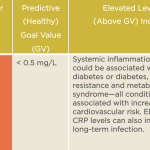The world of healthcare is constantly evolving, and one crucial aspect that has gained significant attention in recent years is the highly sensitive test: C-Reactive Protein (hs-CRP). As a vital biomarker, hs-CRP has revolutionized the way doctors diagnose and treat various conditions, from cardiovascular diseases to inflammatory disorders.
What is HS-CRP?
A C-Reactive Protein is a protein that is produced by the liver in response to inflammation. The “highly sensitive” part refers to the test’s ability to detect even slight elevations in CRP levels, making it an invaluable tool for identifying early signs of disease.
The Importance of HS-CRP
So why is hs-CRP such a game-changer? For one, it provides doctors with a more accurate picture of a patient’s overall health. By measuring hs-CRP levels, healthcare professionals can identify potential risks and take proactive measures to prevent complications. This is particularly crucial for patients with conditions like heart disease or diabetes, where even slight changes in CRP levels can indicate a heightened risk of cardiovascular events.
In this blog post, we’ll delve into the world of hs-CRP, exploring its benefits, limitations, and practical applications in various medical settings. Whether you’re a healthcare professional looking to stay up-to-date on the latest diagnostic tools or a patient seeking to better understand your own health markers, this comprehensive guide will provide valuable insights and knowledge.
The world of healthcare is constantly evolving, and one crucial aspect that has gained significant attention in recent years is the highly sensitive test: C-Reactive Protein (hs-CRP). As a vital biomarker, hs-CRP has revolutionized the way doctors diagnose and treat various conditions, from cardiovascular diseases to inflammatory disorders.
What is HS-CRP?
A C-Reactive Protein is a protein that is produced by the liver in response to inflammation. The “highly sensitive” part refers to the test’s ability to detect even slight elevations in CRP levels, making it an invaluable tool for identifying early signs of disease.
The Importance of HS-CRP
So why is hs-CRP such a game-changer? For one, it provides doctors with a more accurate picture of a patient’s overall health. By measuring hs-CRP levels, healthcare professionals can identify potential risks and take proactive measures to prevent complications. This is particularly crucial for patients with conditions like heart disease or diabetes, where even slight changes in CRP levels can indicate a heightened risk of cardiovascular events.
In addition to its role in diagnosing and managing chronic diseases, hs-CRP has also been linked to various inflammatory disorders, including rheumatoid arthritis, lupus, and inflammatory bowel disease. By monitoring hs-CRP levels, doctors can track the effectiveness of treatment regimens and make adjustments as needed.
Furthermore, hs-CRP has been shown to be a valuable predictor of mortality in patients with cardiovascular disease. Studies have demonstrated that elevated hs-CRP levels are associated with increased risk of death from cardiovascular causes, emphasizing the importance of incorporating this biomarker into clinical practice.
When it comes to interpreting hs-CRP results, healthcare professionals must consider factors such as age, sex, and underlying medical conditions. For example, elderly patients may have naturally elevated hs-CRP levels due to age-related inflammation, while patients with chronic kidney disease may have higher levels due to impaired clearance of CRP.
To learn more about the nuances of hs-CRP interpretation, we recommend checking out the American Heart Association’s guidelines on the topic. Additionally, the Centers for Disease Control and Prevention (CDC) provide valuable resources on inflammatory biomarkers, including hs-CRP.
Conclusion
In this section, we’ve explored the importance of highly sensitive C-Reactive Protein (hs-CRP) in modern medicine. From its role in diagnosing and managing chronic diseases to its predictive value for cardiovascular mortality, hs-CRP is a powerful tool that can inform patient care. In our next installment, we’ll delve into the practical applications of hs-CRP testing and explore how it’s being used in various medical settings.
Take the Next Step with Medical Experts
Get personalized guidance from our team of medical and health experts. We’re here to support you.
Start chatIn conclusion, the highly sensitive test: C-Reactive Protein (hs-CRP) has revolutionized the diagnosis and treatment of various conditions, including cardiovascular diseases and inflammatory disorders. By providing doctors with a more accurate picture of a patient’s overall health, hs-CRP enables proactive measures to prevent complications and improve patient outcomes.
Throughout this blog post, we’ve explored the benefits, limitations, and practical applications of hs-CRP in various medical settings. We’ve seen how hs-CRP can be used to identify early signs of disease, monitor treatment efficacy, and guide personalized care plans. As the healthcare landscape continues to evolve, it’s essential for healthcare professionals and patients alike to stay informed about the latest diagnostic tools and technologies.
In this age of precision medicine, the highly sensitive test: C-Reactive Protein (hs-CRP) is an invaluable tool that can help bridge the gap between patient needs and provider expertise. By embracing hs-CRP as a critical component of our diagnostic armamentarium, we can better serve patients and improve health outcomes.



